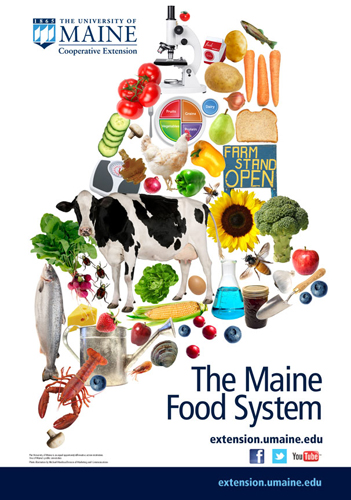About the Maine Food System

Today in the Maine economy, a traditional sector is growing. While it is age-old, it has a great new image, renewed public support and bright prospects for the future.
Let me reintroduce you to farming.
Once thought a dying industry, farming is realizing a renaissance. In the past decade, 1,000 farms have been added in Maine, where more than 1.3 million acres are in agricultural use. This success is dependent on a well-functioning food system in which policy, research, production, processing, commerce, nutrition, and food security and safety are integral and interrelated. And that’s where University of Maine Cooperative Extension comes in.
UMaine Extension is a significant part of the food system in Maine, which has the largest and most diverse agricultural economy in New England. Sales from farms were over $614 million in 2010, led by potatoes, milk, poultry and livestock, eggs, greenhouse/nursery, wild blueberries, and other fruits and vegetables. In each of these commodity areas, UMaine Extension provides research-based information from reliable experts that experienced farmers and new growers alike can trust.
UMaine Extension faculty and staff also provide essential background information to policymakers, legislators, and others as they decide issues related to the food system, including the regulation of pesticides, licensing of food producers and processors, and ways to stimulate the Maine economy for the future.
Many of the recommendations to Maine’s agricultural community come directly from research conducted at UMaine Agricultural and Forest Experiment Station farms. This research-Extension partnership has been working for almost 100 years and is as vital today as it was early in the 20th century.
“Through its multifaceted support of the Maine food system, UMaine Extension champions and contributes to the success of a growing sector of the state economy.”
According to the U.S. Department of Agriculture, more than 95 percent of Maine farms are classified as small — operations that lack the resources and expertise to manage all the challenges they face. UMaine Extension experts help them reduce risk and manage threats, such as diseases, pests and weather.
The same is true for the larger agricultural industries. With UMaine’s assistance, the wild blueberry industry tripled its production in the past 25 years. The potato industry saves more than $20 million annually with UMaine’s help in managing late blight disease. Maine’s maple syrup industry has increased its product quality and profitability, and strawberry, potato, and sweet corn growers have been introduced to new varieties to attract customers.
But producing a quality crop isn’t enough in our complex economy. UMaine Extension also supports the business portion of the Maine food system, including the development of new and value-added products and food processing improvements. UMaine Extension even offers a Recipe to Market program in which entrepreneurs learn how to launch food-based businesses.
And because food safety is a major concern for everyone, UMaine Extension provides essential education to producers, processors, and consumers. Working in partnership with state and federal regulators, UMaine Extension offers technical information, product testing and problem solving for science-based solutions to food safety.
Similarly, UMaine Extension is committed to using education to address two of Maine’s most urgent challenges: hunger and childhood obesity. It is estimated that two-thirds of Maine adults and more than a quarter of high school-aged youths are overweight or obese — a reality that has serious implications for the health of Maine people. In addition, the USDA estimates that 200,000 Mainers don’t have enough to eat.
That’s why UMaine Extension is committed to initiatives such as Maine Harvest for Hunger, an effort to grow fresh vegetables and fruits to donate to food pantries and soup kitchens. Horticulture education leads to better gardens and nutrition education provides information on how to prepare healthy meals.
Extension also conducts the Expanded Food and Nutrition Education Program (EFNEP), a nutrition education program, to help clients learn to stretch their resources and better feed their families, make wise dietary choices and develop healthier lifestyles. This successful program exists in every county in Maine.
Through its multifaceted support of the Maine food system, UMaine Extension champions and contributes to the success of a growing sector of the state economy. It’s a natural role for Extension, a part of Maine’s land-grant university. Now more than ever, University of Maine Cooperative Extension is making a difference people in the state can taste.
